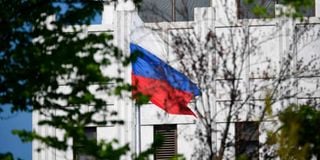Moscow’s tactics to gain influence in Kenya should concern everyone

The Russian flag flies at the embassy's compound in Washington, DC, on April 15, 2021.
Russia’s tactics of spreading disinformation, manipulating narratives and exploiting social media are on the rise in Africa with Kenya being a notable target in the Kremlin’s crosshairs.
Ignoring this problem would not only be remiss, it would be falling directly into the hands of Moscow’s designs for the region, considering the way in which these actions are indicative of a broader strategy at play.
Pro-Russian forces have been collaborating with local actors, including bloggers and journalists, in countries such as Kenya, Burkina Faso and Mali as a means of accomplishing their strategic aims. Their objectives are two-fold: To bolster Russia’s image while tarnishing the reputations of Western nations.
The Kremlin’s charm offensive in Africa has been purposefully designed to strengthen its ties with the continent with Russia’s messaging presenting the country as the most reliable ally for African countries, offering food and fertiliser as well as taking the side of developing nations on the international stage.
According to the Africa Center for Strategic Studies, since 2022, Kenya has been one of the many African countries targeted by Russia in a bid to exert its political influence. Last year, Kenya alone received 30,000 tonnes of fertiliser through this programme.
Russia has been fabricating false narratives and endeavouring to weaponise mass media and communication channels to disseminate highly coordinated and misleading stories through deceptive but cutting-edge disinformation campaigns. These include deep fakes and other tactics to manipulate public perceptions of Russia and the issues at hand.
Kenya has thus emerged as a significant hub for complex disinformation campaigns. The tactics have become increasingly extreme with time, with even fake newspaper covers being employed to spread misleading information about local politicians across online platforms. The successful infiltration of this disinformation adds a concerning layer to this issue, complicating the landscape.
Disinformation has not been the only tool in Moscow’s arsenal, with misinformation playing a similarly important role. In the run-up to the 2022 presidential elections in Kenya, for example, the Russian Ambassador to Kenya, Dmitry Maksimychev, suggested that the West was responsible for Africa’s problems. He said the West should be held accountable for the high food and fuel prices and Moscow’s invasion of Ukraine.
A creative way in which Russia works to disseminate its propaganda and disinformation in Africa is to do so ‘organically’—by leveraging social media influencers, intellectuals and prominent media figures. In 2022, Moscow successfully got Kenyan users on X (formerly Twitter) to use pro-Russian hashtags #IStandWithPutin and #IStandWithRussia to support Russia’s invasion of Ukraine even on mundane everyday posts. For weeks, the hashtag #IStandWithPutin was a heavily trending topic on the platform in Africa—including in Kenya, Nigeria and South Africa.
The narrative being pushed by the Kremlin is one of Western hypocrisy, double standards and racism towards countries like Kenya. This aims at garnering support and improving Russia’s own image through manipulation of such sensitive topics.
The Russian embassy in Nairobi has, for example, made provocative statements on various platforms, including X, to criticise the West’s supposed interference in Kenya’s internal affairs. For example, last year’s protests by the Opposition over the high cost of living was a topic of discussion and provided material for Russia to attract support. It also used the debate around same-sex relations to criticise the West for supposedly promoting a pro-homosexuality agenda in Kenya.
Kenya, alongside nations like Sudan, has not been spared from Russia’s manipulation of religion to propagate its influence through disinformation narratives such as “Thank you Putin for securing the fate of Christianity in Kenya”. This is part and parcel of Russia’s plan to seduce Christians in Africa, who are reportedly split following the Ukraine war, causing ripples in Africa’s Orthodox church with clergy taking sides. Some have rebelled against Russia’s invasion of Ukraine. The Russian church’s activity has only intensified.
Russia’s extensive use of disinformation, the spreading of outright falsehoods, misinformation and manipulation of the truth in Africa represents a concerning and developing phenomenon. Exploiting internal divides, spreading fake news and leveraging social media platforms has helped to manipulate narratives and sow discord around the world with a focus on Africa, where it identifies a potentially sympathetic audience.
The consequences of these impactful actions are far-reaching, exacerbating existing tensions, undermining democratic processes and hindering socioeconomic development. That calls for an urgent concerted effort from African governments and the international community, who must begin using proactive measures, setting up safeguards against Moscow’s nefarious efforts before the opportunity to stop this worrying trend is lost.
- Mr Kennedy is a digital researcher and online communications expert. [email protected].




